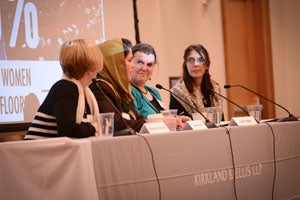During the 2012 election cycle, a record number of women won seats in Congress. Still, women make up just 19 percent of Congress and hold only five governorships.
In an effort to build momentum following the 2012 races, the Women’s Law Association hosted its annual conference on February 8, entitled “19%: When Will Women Have the Floor?” Experts and professionals gathered to discuss how to close the gender gap in politics, and what role lawyers can play in that process.
The conference featured a keynote by Stephanie Schriock, the cofounder of EMILY’s List, an organization that supports female candidates for office, as well as panels on a variety of topics, including international models of women’s participation, the role of gender on the campaign trail, and voter disenfranchisement.
In the first panel, “Models from Abroad; International Pathways to Women’s Participation,” panelists extolled the virtues of electoral gender quotas, or requirements that women make up a certain proportion of the government. They also discussed, more broadly, how the quality of women’s participation can be increased, and how the lessons of other governments can be applied to improve participation in the United States.
Featured on the panel were a range of voices: Fawzia Koofi, the first woman to be Second Deputy Speaker of Parliament in Afghanistan, Cathy Allen, an international political consultant and president of The Connections Group, and Mona Krook, an associate professor of political science at Rutgers University who has extensively studied electoral gender quotas. The panel was moderated by Mindy Jane Roseman, lecturer and academic director of the Human Rights Program at HLS.
Panel 1, “Models from Abroad; International Pathways to Women’s Participation” (requires QuickTime)
According to Krook, the countries that have made strides in increasing women’s political participation have typically instituted gender quota policies. Rwanda, for example, was the first country in the world to elect more women than men, and that process began with a quota. New quotas, she said, are being implemented all the time: Saudi Arabia recently passed a 20 percent quota for women, and Zimbabwe is discussing one as well.
“What it takes to get to the top is deliberate intervention,” she said. “It’s exciting because it really has become a global norm in terms of recognizing the importance of gender balanced decision-making.”
Koofi spoke about the impact of quotas from personal experience. Under the Taliban, she said, women were deprived of education and basic rights. The new constitution, approved in 2004, instituted quotas to include women in political life, requiring one-quarter of the total members of Parliament to be women. Such quotas, she said had a positive impact, and the number of women who won open seats without the help of the quota increased from the first election to the second.

Stephanie Schriock, cofounder of EMILY’s List, delivered the keynote address.
Changes in levels of political participation have been much slower in the United States than elsewhere, Krook said. Quotas remain controversial here, Allen said, because people perceive them as putting up divisions between women and men. However, she argued, quotas are not meant to be panaceas—they are meant to bring women’s voices to the table. In the U.S., she believes, quotas would not just boost participation in politics, but also help women generally gain access to capital.
Still, quotas only increase the number of women in government, and so the panelists also considered how to ensure that women participate meaningfully in the political process once they are elected. In large part, this comes from strength in numbers, they said.
“[You need] quantity participation initially in order to ensure quality participation later on,” Koofi said.
According to Koofi, when women first begin to take elected office, they are symbols more than they are active participants. But in Afghanistan, over time, women in the parliament began to become the most outspoken, reformist representatives. This is often true generally, Allen said: the first few women who enter the government are “tokens,” Allen said, but after they reach critical mass (about 20 percent, she said), they start to effect change.
In Rwanda, for example, about 38 percent of elected representatives were women during the first quota year, Allen said. But once in office, they managed to pull money from corrupt police budgets and direct it toward dealing with infant mortality by cleaning up water sources. Rwandans began to see the possibilities of good governance, Allen explained, and women were voted into Parliament in greater numbers.

Beyond increasing the sheer numbers of women in government, quotas can have a positive impact on perceptions of women, Krook said. Studies of local government quotas in India show that when a position has been reserved only one time for a woman, people think men make better leaders then women. But if a position has been reserved two times, people think men and women make equally good leaders and the difference is highest in men. Koofi also noted that female political participation can reduce gender-based violence in society.
To close the panel, Roseman asked the panelists to reflect on how lessons from the international context could be applied to improve political participation in the United States. There remains a need for good role models, Koofi said, and urged women from across the world to support each other in increasing political participation globally. For Krook and Allen, the cases of other countries reveal the importance of concrete actions.
“Things can look different, [but] waiting gets us nowhere,” she said. The changes in political participation in the U.S. so far have come about largely because of organizations like EMILY’s List and political training programs. At the moment, she said, women are incredibly educated—it is now a matter of inspiring them to run for office and gathering support for them.
For Allen, though, it comes down to quotas: “If you want to ignore quotas, you do so at your peril.”
